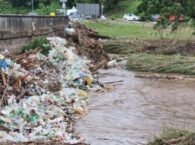UW-Madison student creates master plan for Monona’s trails system
Jordan Teichen and Professor Eric Schuchardt collaborate to develop a regional trail system which starts in and extends out of the City of Monona
Metrics
Community
City of Monona, WI, United StatesCommunity Size
8,045 (2018 Census Estimation)University
University of Wisconsin - MadisonProgram
UniverCity YearYears
2016/2017Status
CompletedCase Type
Project StoriesRegion
EPA Region 5, USAThe preservation of natural spaces has long been a means of improving the lives of citizens within different societies throughout time. Research has shown that even short periods of time spent within public outdoor spaces can improve overall health and lower risk of psychiatric disorders.
The City of Monona, Wisconsin, considered creating a regional trail system—alongside making improvements to its popular recreational space, Ahuska Park—to “encourage healthy living for its residents.” City officials knew they would have to approach the project “through the lens of public health” to provide benefits for all members of its community (UniverCity project final report).
The UniverCity Year program of the University of Wisconsin-Madison, an EPIC-Network member, was created to help local government and community partners with identified sustainability and livability projects. Participating University faculty incorporate community-identified projects into classes, and provide students with on-the-ground experience in support of a more sustainable and livable future for the partnered community.
During the 2016 to 2017 academic year, the City of Monona was chosen to partner with the UniverCity Year program due to its proximity to the university and for strong support from Mayor Bob Miller.
Student and professor get to planning
The UniverCity Year program partnered UW-Madison’s Landscape Architecture: Senior Capstone with the City of Monona to analyze potential improvements to the city’s trails and park accessibility. With the guidance of Professor Eric Schuchardt, student Jordan Teichen sought to “increase neighborhood and regional connections to Ahuska Park” and “create [a] regional trail system with a strong identity” (UniverCity project final report).
Teichen and Schuchardt completed this project by:
- Reading literary papers from professional and academic public health journals concerning physical activity within system or urban nature
- Researching precedent communities, which included:
- Clarksville Liberty Park in Clarksville, TN
- Monona Waterfront redevelopment in Monona, WI
- Caramel Clay Central Park in Caramel, IN
- Regional and community investigations were performed to better understand regional traffic and transportation volumes, existing land use, community disconnect, and resident’s need for nature trails
Master trail plan comes to fruition
Teichen’s capstone project resulted in the creation of a master plan for a regional trail system founded in the City of Monona. The site design included redevelopments for existing structures at Ahuska Park, including an expanded parking lot and improved baseball field seating, along with the creation of a specialized marketing and events space.
Student creates interactive five-mile trail loop
Moreover, Teichen’s plan involved the creation of a five-mile loop which would “connect the Lower Yahara River Trail to the south, the waterfront redevelopment and the Lake Loop to the northwest and circle around Upper Mud Lake” (UniverCity year-end guide). Additions to this loop included plans for:
- A three-mile wetland boardwalk
- A half-mile riverwalk
- A stormwater management system
- Planting plans to be implemented throughout Ahuska Park
- Rest stops with shade structures resembling white wings, the Ho-Chunk meaning of “Ahuska”
The master plan provided by student Jordan Teichen and Professor Eric Schuchardt provides the City of Monona with a practical blueprint to both improve Ahuska Park and create a larger trail system connected to it. With more research and the allocation of necessary funds, Monona can effectively implement this plan for the benefit of all residents and tourists.


